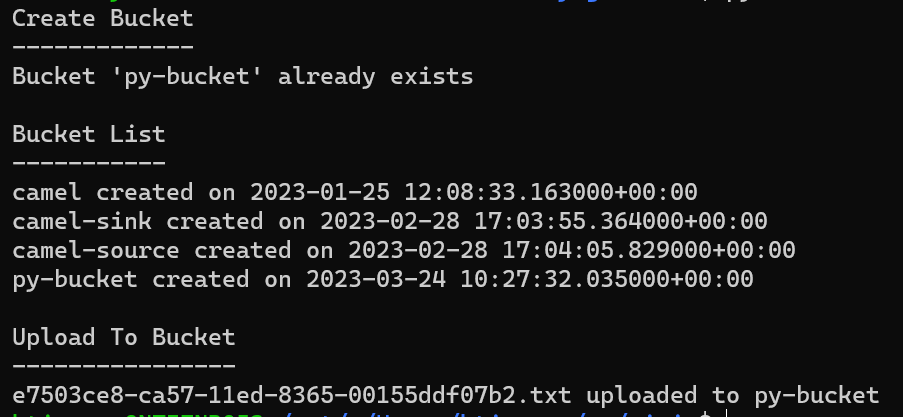...
| Code Block | ||||
|---|---|---|---|---|
| ||||
from keycloak import KeycloakOpenID
import requests
import xmltodict
from minio import Minio
from minio.error import (ResponseError, BucketAlreadyOwnedByYou, BucketAlreadyExists)
import uuid
import io
def get_token():
# Configure client
keycloak_openid = KeycloakOpenID(server_url="http://keycloak:8080",
client_id="minio-cli",
realm_name="minio",
client_secret_key="YVZGoUdprHmqexlX30stzGWwZtT2SNll")
return keycloak_openid.token(grant_type='client_credentials')
def get_credentials():
token = get_token()
r = requests.post("http://minio:9000",
data={
'Action': "AssumeRoleWithWebIdentity",
'Version': "2011-06-15",
'WebIdentityToken': token['id_token'],
'DurationSeconds': token['expires_in']
})
tree = xmltodict.parse(r.content)
return dict(tree['AssumeRoleWithWebIdentityResponse']['AssumeRoleWithWebIdentityResult']['Credentials'])
# Retrieve credenstials
credenstials = get_credentials()
# Initialize Minio client
client = Minio(
"minio:9000",
access_key=credenstials['AccessKeyId'],
secret_key=credenstials['SecretAccessKey'],
session_token=credenstials['SessionToken'],
secure=False,
region=None,
http_client=None,
credentials=None
)
# Create bucket if it doesn't already exist
print("Create Bucket")
print("-------------")
bucket_name = "py-bucket"
found = client.bucket_exists(bucket_name)
if not found:
client.make_bucket(bucket_name)
print(f"Bucket '{bucket_name}' created")
else:
print(f"Bucket '{bucket_name}' already exists")
buckets = client.list_buckets()
# Retrieve list of buckets
print("\nBucket List")
print("-----------")
for bucket in buckets:
print(f"{bucket.name} created on {bucket.creation_date}")
# Upload an object to a bucket
data = "I want to stream some data to minio"
object_bytes = data.encode('utf-8')
object_stream = io.BytesIO(object_bytes)
object_name = f"{uuid.uuid1()}.txt"
print("\nUpload To Bucket")
print("----------------")
try:
client.put_object(bucket_name, object_name, object_stream , len(object_bytes))
print(f"{object_name} uploaded to {bucket_name}")
except Exception as ex:
raise ex |
Sample output:
A similar program written in go is available here: Minio Go ClientThis program
Links
Configure MinIO for Authentication using OpenID
...
